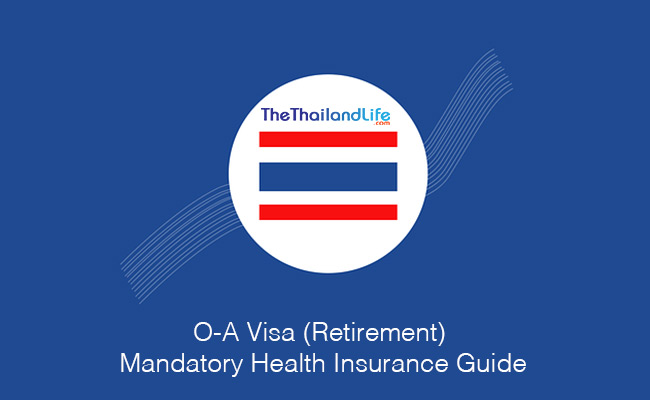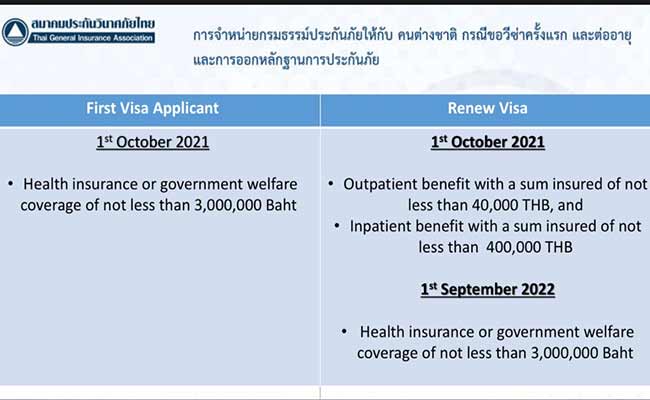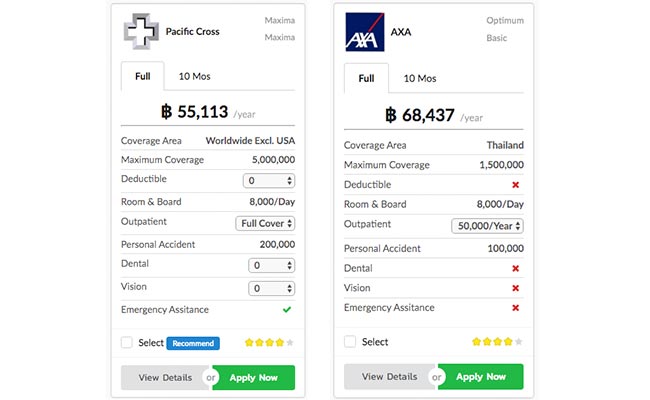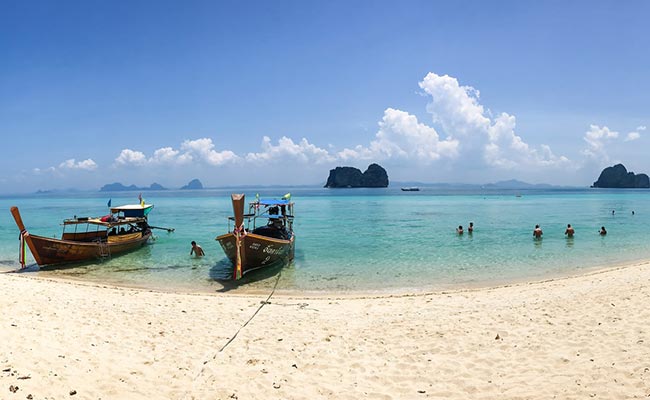If you've got questions about the mandatory retirement visa health insurance requirement (O-A visa), this FAQ will answer those questions, and much more.
Please also note that as of late 2021, the requirement has been extended (in some countries) to those applying for a Non Immigrant O Visa too. More on that later on.
In this post I'll cover the following:
- Why you need health insurance.
- Who the approved companies are.
- How much you can expect to pay.
- How to get it cheaper than advertised.
- And how you can avoid this requirement altogether!

What is an O-A (Retirement) Visa?
The O-A is commonly known as a ‘retirement visa', though there isn't officially a visa called the ‘retirement visa'.
It is for those aged 50+ who want to stay in Thailand for a period of 1 year, without the intention of working. You can extend after the year is up, provided you meet the financial requirements.
The O-A is obtained in your home country and, when you enter Thailand, you are stamped in for a year.
The new mandatory health insurance rule applies to both new Non-Immigrant O-A visa applicants and current Non-Immigrant O-A visa holders who obtained the visa after the enforcement date.
What other visas are affected by this rule?
As of August 2021, some embassies now require this health insurance for those applying for a Non O Immigrant Visa.
I expect this to be rolled out across the board, but currently the requirement is active in Japan, some US states, and some European countries. The UK is not yet affected.
The reason for this has not been announced, but it is most likely to bring the O and O-A retirement pathways into line.
Previously, those applying for the O Visa and then doing a retirement extension in Thailand could avoid this health insurance requirement, whereas those going down the O-A Visa retirement route needed to get their year's worth of insurance in their home country before flying.
Bear in mind that the Non Immigrant O Visa is issued for 90 days (single entry), so the insurance needs only cover this duration. The O-A Visa is issued for a year, so the insurance policy needs to cover this period.
Holders of the Non-Immigrant O-X visa have needed mandatory insurance since 2017. No other visas require this mandatory health insurance.
Why introduce mandatory health insurance?
Back in May 2019, a representative of the International Health Division (Health Service Support Department), stated that in 2017 and 2018, foreigners incurred non-paid medical bills amounting to 349 million Baht, and 305 million Baht, respectively.
The records show that in 2017, 565,000 out of 3.3 million visitors didn't pay their medical bills. In 2018, the figure rose to 680,000 out of 3.42 million visitors.
They say the majority of unpaid bills were from retirees on long-stay visas.
I'm not convinced of that, but what is true is that those 50+ years old are more likely to develop long-term illness. The bill for heart disease, cancer, type-2 diabetes complications, etc., can be a very expensive one.
But don't most expats have insurance anyway?
You would think so. Most I meet do. Furthermore, the majority of stories in the papers surrounding unpaid medical bills are usually regarding tourists in motorbike accidents.
A better solution might have been:
- A. charging a 500 Baht entry fee to each person entering the country (per year) – this would have covered the cost of unpaid bills cited by the health department.
- B. making sure everyone who enters the country has medical insurance!
But we are where we are now. Let's move on.
How much cover do I need?
Currently, for those that are already in Thailand on an O-A visa, the requirement remains at the old rate of 400,000 in patient and 40,000 of out patient coverage. You can still extend your current visa inside Thailand on this requirement.

Where do I get my retirement visa health insurance?
Those in charge have come up with an approved list of local insurance providers:
The companies are as follows:
- Thai Health Insurance
- LMG
- The Viriyah
- Pacific Cross
- Falcon
- Thaivivat
- AXA
- Navakij
- Dhipaya
- Asia Insurance
- Aetna
- Sompo Insurance
You have to use one of these providers and present your premium with your visa application. The premium must meet the minimum requirements.
How much are the premiums?
Reasonable, I guess, depending on your exchange rate, and if the insurance cover is solely for Thailand.
Once you get to 60+ years it starts to get expensive. And if you want regional or international cover the price rockets.
I've had a fair few emails from disgruntled readers. Here's one that explains how restrictive this new rule can be for those over 65 and 70:
4 carriers on the Thailand Long Term Insurance website will insure me at 70 years or older. For me at age 71, the rates range from 69,000 to 81,000 Baht per year. This is prior to an exam and underwriting and subject to change.
The rates are almost double what a 65 year old pays. At 75 years they increase 33% and at 80 66%, respectively.
So only 4 out of the 7 will actually insure those who are 70+. And for those 80+, there are no options.
Indeed, Thaivivat Insurance goes highest in terms of age. They will insure you at 76 years old, with renewals up to 100 years old – starting at 120,000 Baht.
Is there a cheaper option?
Yes. I found that if you use the Mister Prakan site you can can shave a bit off the premiums.
This site covers numerous companies and five on the approved O-A visa list:
- AXA
- Pacific Cross
- LMG
- Viriyah
- Thaivivat
So you can get cover from one of those approved providers and save money on going through the government website.
Here's a couple of quotes I got based on being 50 years old and exceeding the 40k outpatient and 400k inpatient cover. I'm 41 but to be eligible for an O-A visa you have to be 50.

+ Click here for quotes on the Mister Prakan site
I don't want this insurance/have my own, what can I do?
Don't get an O-A visa.
But I want to retire in Thailand, is there another way?
Yes. Get a Non Immigrant O Visa. You don't need the mandatory health insurance for this visa, unless you are living in one of the aforementioned countries that are now asking for this cover as part of the application process.
Still, even if you do require it, you only need 90 day's worth of coverage.
How is a Non Immigrant O Visa different from the O-A?
An ‘O' category visa can be issued for a range of purposes such as visiting family or friends in Thailand, taking a voluntary job, getting medical treatment, attending a judicial process, and even to work as diplomat's housekeeper.
It can also be issued for the purpose of retirement. Good news.
Where retirement is concerned, you can obtain a single entry Non Immigrant O Visa from your home country, or neighboring country to Thailand, which gives you entry to Thailand for 90 days.
After 60 days in Thailand, you can apply for a 1-year extension at an immigration office – providing you meet the financial requirements, as stipulated in my retirement visa post.
Put simply: in most countries the Non O Visa does not require the mandatory health insurance, and the O-A does.
I want still want good health insurance. Any recommendations?
Yes. Check out these providers here. Also, you can get an immediate quote from Cigna by clicking here. It takes 2 minutes to do.
————
Got a question? Did I miss something? Leave it in the comments section below.
Last Updated on



Geoff Sloman says
Aug 21, 2020 at 3:38 pm
TheThailandLife says
Aug 21, 2020 at 5:36 pm
Geoff Sloman says
Aug 21, 2020 at 8:09 pm
TheThailandLife says
Aug 21, 2020 at 8:50 pm
Geoff Sloman says
Aug 22, 2020 at 6:47 am
Geoff Sloman says
Aug 22, 2020 at 6:57 am
David says
Feb 02, 2021 at 5:02 am
JamesE says
Feb 02, 2021 at 5:18 pm
Steve says
Nov 12, 2020 at 11:35 am
Robert MacLean says
Aug 20, 2020 at 11:35 pm
TheThailandLife says
Aug 21, 2020 at 5:43 pm
Bubba says
Nov 13, 2020 at 4:09 pm
Geoff Slonan says
Nov 13, 2020 at 6:28 pm
cyber_Mark says
May 10, 2020 at 1:04 pm
john seals says
Jun 09, 2020 at 10:38 am
Cyber-Mark says
Otherwise, all those seeking the marriage visa would not need to organise their own cover.
Again AFAIK... you do NOT need to gt the specific policy with those requirements listed above if you go for the marriage visa.
I could be wrong but that's how it was explained to me.
Jun 10, 2020 at 12:15 am
Kevin Hoye says
Footnote
I have just met a lovely lady and we plan to marry, she is a government school teacher and told me about this yesterday 8th September 2020. My visa expires on 25th so we don't have time to marry before I must leave Thailand (Non Imm O-A and having problems getting insured, 66 years old and 2013 pre existing health history - atrial fibrillation - from which I have a 7 year proof of non recurrance following a procedure which cured my problem )
Sep 09, 2020 at 11:17 am
Martin Doherty says
If I leave Thailand for A uk visit on my return will immigration want to see health insurance cert as well as the Re entry permit?
Aug 02, 2020 at 3:36 pm
Kevin Hoye says
Sep 09, 2020 at 11:20 am
sidney leonard says
Is it still the case that the mandatory health insurance requirement does not apply to the Non Immigrant O visa, and that said visa can still be issued for the purpose of retirement? A recent posting said that his understanding from his lawyer was that the requirement applied to both O and OA visas.
Thank you.
May 01, 2020 at 1:42 am
Vincent says
But I would have to read a comment from someone who renewed his non O retirement after October 2019 and the new regulation for health insurance.
May 04, 2020 at 8:17 am
Kevin Hoye says
Sep 09, 2020 at 11:22 am
Vincent says
Has someone already experienced after November 2019 an extension of stay based on Non O retirement at Bangkok CW? Was a Health insurance certificate required ?
What is happening if your yearly insurance is ending before the end of your next « 1 year extension »? Will the Thai immigration adjust your extension with the remaining validity of your health insurance?
Apr 28, 2020 at 10:40 am
Glen says
Thanks for all your sterling work and can I say comprehensive, comprehensible and easy to digest presentation style! Quick q. Been in Thailand since April 2109 on an OA. If I convert from OA to O will I get a better deal on insurance do you know? I mean generally speaking if I buy from a UK provider will I get a better deal than those provided by the 12 nominated Thai providers?
Apr 09, 2020 at 7:19 am
Steven Ginn says
The only providers that the junta accepts are the 12 posted on the Immigration site. Just another scam to suck money out of farangs, sadly.
May 01, 2020 at 2:58 pm
Kevin Hoye says
Sep 09, 2020 at 11:25 am
Ken F says
Of course I can’t really blame the Thai government for not wanting to get stuck footing the bill for all these deadbeat foreigners – even if they are going about remedying the situation in totally the wrong way. No, I’ll reserve all my ire for all those deadbeat foreigners who caused this situation in the first place. If the statistics given in the article are correct this means that about ten percent of all visitors to Thailand require some sort of medical treatment while there, and that of those people who do, a whopping twenty percent of them do not pay their hospital bills. That’s an astoundingly high percentage, particularly when you consider that most of these visitors came from countries that are much wealthier than Thailand. And if we exclude medical tourism from the statistics and only include those who did not plan on getting sick or injured while in Thailand then the percentage of non-payers is more like 25%. Speaking of which, how on earth is it that someone on a Thai retirement visa cannot afford to pay his own medical bills? After all, if these people have either the required 65,000 baht a month income (500% more than the average Thai income) or 800,000 Thai baht in the bank, they should have absolutely no trouble whatsoever paying their medical bills in Thailand (even major surgery is fairly cheap in Thailand compared to the USA). Not to mention the fact that people with good salaries and large savings accounts are typically responsible enough types that they would likely already have medical insurance.
So I guess the real question is, are these deadbeats somehow circumventing the visa requirements, or are they just so addicted to prostitutes and booze that they are habitually broke? Or perhaps the Thai government is incorrect in its assertion that most of the offenders posses long term visas. By the way, I actually have absolutely no problem with either prostitution or booze but I do have a big problem with people who live beyond their means and then expect others to ultimately pick up the tab for them.
In any case, there is really no excuse for someone who meets these income requirements to become a financial liability to their new adopted country. When I lived in Phuket ten years ago with my Thai girlfriend I actually splurged on a very nice and very modern house with a private pool, but aside from rent our total combined monthly expenses only came out to about $450 US, and we lived a pretty comfortable life. And even when you include rent we were still living on about half of what I would be required to have in income in order to qualify for a retirement visa. So, basically, if I lived in Thailand today and I had the required $2100 a month in income I would have more money than I knew what to do with and I certainly would have no problem paying any medical bills I might incur. Also I would think that most people who decide to retire in a foreign country are going to have a substantial amount in savings as well as at least one credit card with a decently high limit on it for emergencies.
But then again, perhaps Thailand has just become a magnet for deadbeats from around the globe – deadbeats who mostly just sit around all day bitching and moaning about how “unfairly” they are being treated in their new host country. Basically these are people who think the world owes them a living and who probably can't handle the fact that THEY are now suddenly the minority race.
Feb 24, 2020 at 6:19 am
TheThailandLife says
Feb 24, 2020 at 5:37 pm
Ken Furber says
It sounds to me like you are saying that if I get the O Visa first and then change over to the O-A Visa after 60 days (which I was planning on doing anyway) that I will not be required to get medical insurance, not even after the changeover. That can’t be right. Can it? It would certainly be nice if true. Of course, I have to say that the exchange rates also have me a bit worried lately. When I was spending a lot of time in Thailand in the early 00’s the exchange rate was about 45 baht per US dollar but for the past decade its been hovering around 32 and the 5 year projections show it dropping to 28 by 2024. That means that my $75K in savings may only be 2.1 million baht rather than the 3.4 million that it would have been at the higher exchange rate. And more importantly my already laughably inadequate monthly social security payouts will likely get even less adequate as time goes by.
Mar 01, 2020 at 5:00 pm
James E says
Mar 01, 2020 at 11:10 pm
Ken Furber says
Yes, as someone who has been visiting Thailand since 1990 I am actually intimately familiar with the financial crisis and its aftermath – as well as what led up to it. In any case, I’m not really quite sure what you meant by “overstatement”. After all, when I made the comparison between converting savings at these two different time periods I was in no way suggesting that 45 baht per dollar was normal. I was simply using these two extremes to make a point - the point being to illustrate how drastically things can change and how a retiree living in Thailand on a very small pension in US dollars has to consider that fact that this could get even smaller at any time due to changing exchange rates. Of course this is only really a factor if your pension amount is right on the edge of what you calculate you will need to live in your new country. If you have a suitable buffer on the other hand you needn’t really worry because it’s a fairly safe bet that the exchange rate will stay between 28 and 32 for the foreseeable future.
Still, thanks for pointing me in the direction of some good reference material in the comments. Since things have certainly changed since I last lived in Thailand nearly 10 years ago I will certainly have to brush up on current visa procedures and requirements.
Mar 02, 2020 at 4:50 pm
Steve Ginn says
Is this you, "deadbeats who mostly just sit around all day bitching and moaning about how “unfairly” they are being treated in their new host country."
Feb 24, 2020 at 5:52 pm
Ken Furber says
Well, fortunately most of the foreigners I’ve met while visiting Thailand over the past 30 years have been really great people so I can’t see any reason for anyone to stay away just because of a few bad apples like yourself. And lets face it, if it actually bothers you that I am bothered by the thought of a person from a rich country becoming a financially liability to a poor country then its pretty clear that you are definitely one of those bad apples.
Also, I hate to burst you bubble but there is actually no correlation whatsoever between nationality and this particular negative personality type. And even if there were, this could only be determined by extensive statistical data and not by personal observations. For example, even if men were statistically better drivers then women, every woman you personally know might still be a better driver than every man you know. Still, many people delude themselves into thinking that their own limited personal observations are somehow statistically relevant in determining a pattern among a group consisting of tens of millions of people (they are not). And then there is the fact that when a person grows up harboring feelings of resentment and animosity toward a particular group he will tend to only see what he expects to see in his encounters with members of said group. And this naturally just goes to further re-enforce his already badly skewed perspective. Believe it or not I’ve actually met a few idiots who are convinced that all Toyota’s and Honda’s are junk even though all the statistical data shows that the exact opposite is true. They believe this because this is what they need to believe and little things like facts and reason are not allowed to enter into the equation at all.
By the way, I think you may need to work a bit on your reading comprehension skills. I never once suggested that things are "bad" in Thailand. The problem is I always make very thorough calculations before moving to another country and if the math doesn't work out I will not go because I will not take even the slightest chance of becoming a financial liability to my new host country.
Mar 01, 2020 at 6:32 pm
Steve Ginn says
Mar 02, 2020 at 9:36 am
TheThailandLife says
Mar 02, 2020 at 4:38 pm
Steve Ginn says
Mar 02, 2020 at 7:32 pm
James E says
Feb 24, 2020 at 11:45 pm
Ken Furber says
Yes, its true that they have been making it more difficult for people of moderate means to retire in Thailand but it seems to me that these efforts have mostly consisted of cracking down on existing laws and eliminating the loopholes that foreigners have been taking advantage of for ages. And let’s face it, even with all this, the requirements for a retirement visa in Thailand are still actually pretty similar to those in most other countries in Southeast Asia. In Indonesia, believe it or not, you are actually required to hire a domestic servant when you retire there.
As for the notion that the influx of Chinese tourist over the past decade was the impetus for the recent crackdown on the western "riff-raff, I’m not sure I completely buy into this theory – although it does seem to be the prevailing opinion. The Chinese probably do bring in more money while causing less problems than some other groups but personally I suspect that the crackdown still would have happened regardless of the Chinese tourist influx.
In any case, when the Thai government does make things a bit more difficult for prospective retirees of limited means, like myself, I don’t get angry about it or take it personally in any way. But then again, I don’t have the massive sense of entitlement that some other western expats seem to have. The problem is that when people are allowed to get away with circumventing the rules for a very long period of time they will eventually come to believe that they are somehow entitled to continue doing what they have been doing. And because of this they tend to have an absolute hissy fit when the powers that be suddenly decide to crack down and actually start enforcing these rules. These people will then also invariably insist that their rights are being violated or that they are the victims of discrimination or some other such nonsense. And while this is obviously a rather childish reaction by these people I’m afraid it’s also just human nature.
Mar 02, 2020 at 5:02 pm
James E says
Mar 03, 2020 at 12:28 am
Patrick says
Feb 19, 2020 at 4:47 pm
Stephen says
Feb 07, 2020 at 2:50 pm
TheThailandLife says
Feb 07, 2020 at 4:52 pm
Brian says
Are you talking about expats who are non resident in their home countries? or is this not relevant
Thanks kindly Brian
Feb 06, 2020 at 5:58 pm
TheThailandLife says
Feb 06, 2020 at 6:04 pm